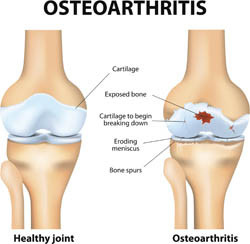New biomarkers for osteoarthritis
OA is the most common type of arthritis and constitutes a key cause of pain and disability in the ageing population. It results from chronic inflammation in the joints — especially in the knees and hips — and progressively leads to loss of articular cartilage. Cartilage damage in OA is detected through X-rays by decreases in joint space width that, however, requires significant cartilage degradation to be observed. As a result, there is a great need for biomarkers that can facilitate early and accurate diagnosis of the disease. The advent of omics technologies has brought rapid progress in biomarker research. However, one needs to understand when and how these biomarkers emerge and when they get cleared to interpret biomarker assays. In this context, the EU-funded 'Novel diagnostics and biomarkers for early identification of chronic inflammatory joint diseases' (D-BOARD)(opens in new window) consortium is bringing together leading European experts to identify new biomarkers that reflect different stages of OA onset and progression. Using patient samples, the plan is to analyse proteomic, metabolomic, genomic and transcriptomic profiles. The selected biomarkers will be used to develop new biochemical and immunological assays for the early diagnosis of OA. Work so far has concentrated on proteins secreted from inflamed cartilage and particular attention has been given to SIRT1 and syndecan-4. Linking these biomarkers with tissue alterations and an overall clinical picture is pivotal for identifying those biomarkers that associate with a particular OA phenotype. Considerable effort is also devoted to understanding how genetic and epigenetic events could be implicated in OA aetiology and susceptibility. The focus is on genes that work on cartilage homeostasis and other pathways. The outcome of D-BOARD will be a series of innovative technologies for biomarker research and new biomarker-based assays for OA. Discovering OA at the asymptomatic stage will help initiate therapy early enough to prevent or delay its course.







